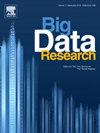Big data analytics for smart home energy management system based on IOMT using AHP and WASPAS
IF 4.2
3区 计算机科学
Q2 COMPUTER SCIENCE, ARTIFICIAL INTELLIGENCE
引用次数: 0
Abstract
The convergence of edge computing and 5G network speed provides an innovative way to address the energy efficiency and low latency requirements in medical data processing, especially from the perspective of the Internet of Medical Things (IoMT). Together, these technologies allow for the quick and effective handling of the enormous volumes of medical data produced by different IoMT devices in the context of smart healthcare systems. The IoMT is bringing cutting-edge technologies, social benefits, and economic advantages to transform modern healthcare systems entirely. Digital healthcare is transforming due to machine learning, which uses sophisticated algorithms to forecast patients’ health status efficiently. These approaches predict the onset of disease, hospital readmissions, and treatment customization by analyzing large medical datasets. Strong data security and good forecast accuracy are still issues. The quality and variety of training data are key factors in making accurate predictions, and strict encryption, safe storage, and regulatory compliance are necessary for data security. By including various significant components from existing research, the current study seeks to determine the most collective features. The goal of the study is to offer a systematic approach for assessing these features identified by using the approaches of the AHP and WASPAS. These approaches are effective for efficient big data analytics in the context of smart home energy management system based on IOMT.
基于AHP和WASPAS的IOMT智能家居能源管理系统大数据分析
边缘计算与5G网络速度的融合为解决医疗数据处理中的能效和低延迟需求提供了一种创新方式,特别是从医疗物联网(IoMT)的角度来看。总之,这些技术允许在智能医疗保健系统的背景下快速有效地处理不同IoMT设备产生的大量医疗数据。IoMT带来了尖端技术、社会效益和经济优势,彻底改变了现代医疗体系。由于机器学习,数字医疗正在发生变化,机器学习使用复杂的算法来有效地预测患者的健康状况。这些方法通过分析大型医疗数据集来预测疾病的发作、再入院和治疗定制。强大的数据安全性和良好的预测准确性仍然是问题。训练数据的质量和多样性是做出准确预测的关键因素,严格的加密、安全存储和法规遵从性是数据安全的必要条件。通过纳入现有研究的各种重要组成部分,目前的研究试图确定最集体的特征。本研究的目的是提供一种系统的方法来评估通过AHP和WASPAS方法确定的这些特征。这些方法对于基于IOMT的智能家居能源管理系统背景下的高效大数据分析是有效的。
本文章由计算机程序翻译,如有差异,请以英文原文为准。
求助全文
约1分钟内获得全文
求助全文
来源期刊

Big Data Research
Computer Science-Computer Science Applications
CiteScore
8.40
自引率
3.00%
发文量
0
期刊介绍:
The journal aims to promote and communicate advances in big data research by providing a fast and high quality forum for researchers, practitioners and policy makers from the very many different communities working on, and with, this topic.
The journal will accept papers on foundational aspects in dealing with big data, as well as papers on specific Platforms and Technologies used to deal with big data. To promote Data Science and interdisciplinary collaboration between fields, and to showcase the benefits of data driven research, papers demonstrating applications of big data in domains as diverse as Geoscience, Social Web, Finance, e-Commerce, Health Care, Environment and Climate, Physics and Astronomy, Chemistry, life sciences and drug discovery, digital libraries and scientific publications, security and government will also be considered. Occasionally the journal may publish whitepapers on policies, standards and best practices.
 求助内容:
求助内容: 应助结果提醒方式:
应助结果提醒方式:


